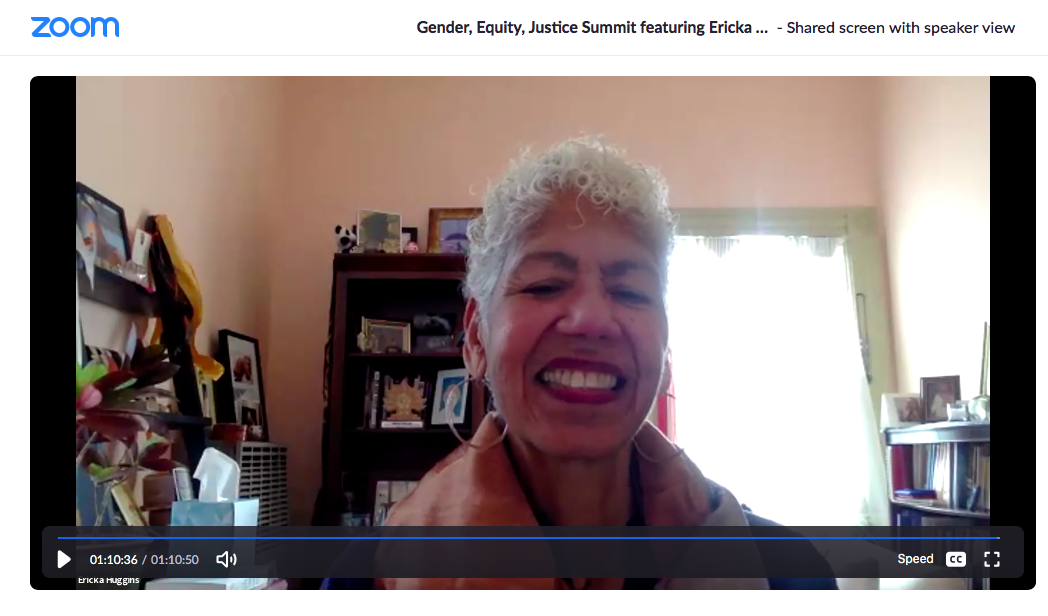The Women’s Community Center (WCC) hosted its annual Gender Equity and Justice Summit Thursday in a Zoom meeting featuring activist Ericka Huggins with the theme of “Love, Resilience, and Self-Love.”
Huggins describes herself as a “human rights activist, poet, educator, Black Panther Party leader and former political prisoner.” She was a leading member of the Black Panther Party for 14 years and is the first woman and first black person to be appointed to the Alameda County Board of Education. She also served as a professor of women and gender studies at San Francisco State University and California State University, East Bay.
While held online, the hour-long event opened with a land acknowledgment, a speech recognizing the indigenous history of the land that participants were located on, by WCC student staff member Baylee Basila ’21.
Huggins discussed topics including her own activism, her time in incarceration and her outlook on life. Huggins, who became a widow and single mother at age 19, used meditation and writing as a method of self-care during her time in incarceration and solitary confinement.
“By the time I was incarcerated and grieving the death of my husband John and seperated from my baby, I knew that I could not continue forward in this sad and alone way,” Huggins said. “I learned to sit still and breathe. And as I did so, day after day after day, I recognized something about me — that I loved. That I never loved before. That I never even recognized as lovable.”
Huggins acknowledged that self-care and resilience were not always easy, but described developing a new way to look at her situation.
“Wherever there is darkness, that is just a covering over the light,” she said. “And what I recognized in the darkest of times for myself personally is that the light is always there inside me.”
Summit coordinator and WCC student staff member Jenna Jung ’22 sees Huggins’ message as increasingly relevant at a time when many are stuck inside.
“Her isolation in solitary confinement was very different from the circumstances of many of us now, but Ericka still has many lessons on maintaining the self and being mindful, taking action on the inequities highlighted by the pandemic,” Jung said.
Participants repeatedly returned to discussing COVID-19, and how the pandemic highlights oppressive systems in the United States.
“It is important to recognize that the conditions of poverty that black and brown people and Southeast Asian people and indigenous people live in is not because of COVID-19,” Huggins said. “It is because of systems that have been in place for multiple generations.”
“Since there was no intervention, this multi-generational trauma has continued,” Huggins added.
Jung said discussing COVID-19 had led her to feel strong emotions.
“I feel like anger can get the best of us when we do talk about these issues and injustices, just to feel angry about the world,” she said.
Huggins described love as an answer to feelings like these, and a way to lift up communities.
“Just remember that love is a great power, and you can use it to transform our world,” Huggins said.
Ellie Utter ’20 felt moved by Huggins’s stories and messages.
“Listening to this, during the current situation, helped me recognize how I can still take part in activism and how I can still show love for those in my community and beyond despite social isolation,” she said.
Utter also praised the organizers for following through on holding the event.
“I was so amazed and grateful to the WCC for following through on such an important event despite the current situation,” she said. “Huggins’s message of empathy and resilience will be relevant for the rest of time.”
The summit ran for 13 years as the Stanford Women’s Leadership Conference before being renamed. Last year, the WCC hosted Danica Roem, the first openly transgender person to be elected and serve in a state legislature.
Contact Lauryn Johnson at lauryn ‘at’ stanford.edu.
